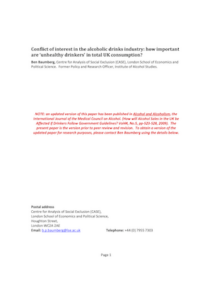View this report

The ‘alcohol industry’ has been advancing an agenda of Corporate Social Responsibility, claiming that there is no conflict between commercial interests and public health goals. This study subjects this claim to critical scrutiny by estimating the share of total alcohol consumption that is due to ‘unhealthy drinkers’ in the UK, extending previous studies geographically, methodologically and conceptually.
Secondary analysis of the amount of alcohol consumption above various official guidelines in four British datasets for 2000-2002: the National Diet and Nutrition Survey; the General Household Survey; Smoking, Drinking and Drug Use Among Young People; and the March 2002 ONS Omnibus Survey.
Unhealthy drinking accounts for 55-82% of total consumption by 18-64 year olds, depending on the definition of unhealthy drinking used. If only alcohol above the official guidelines is counted, this falls to 22-47%. Consumption by underage drinkers accounts for 4.5% of total consumption, while consumption by drink-drivers accounts for 0.5-8.0% depending on the assumptions made.
This study shows that the role of unhealthy drinkers in total consumption depends heavily on the assumptions made, namely whether to count drinking above guidelines or all drinking, and the definition of unhealthy drinking used. Nevertheless, in the absence of any countervailing factors there is a significant potential conflict of interest under any assumptions, in contrast to the alcohol industry’s claims. Further research is needed to examine whether other potential motivations of the alcohol industry compensate this potential conflict of interest sufficiently to achieve genuinely responsible behaviour.
View this report
